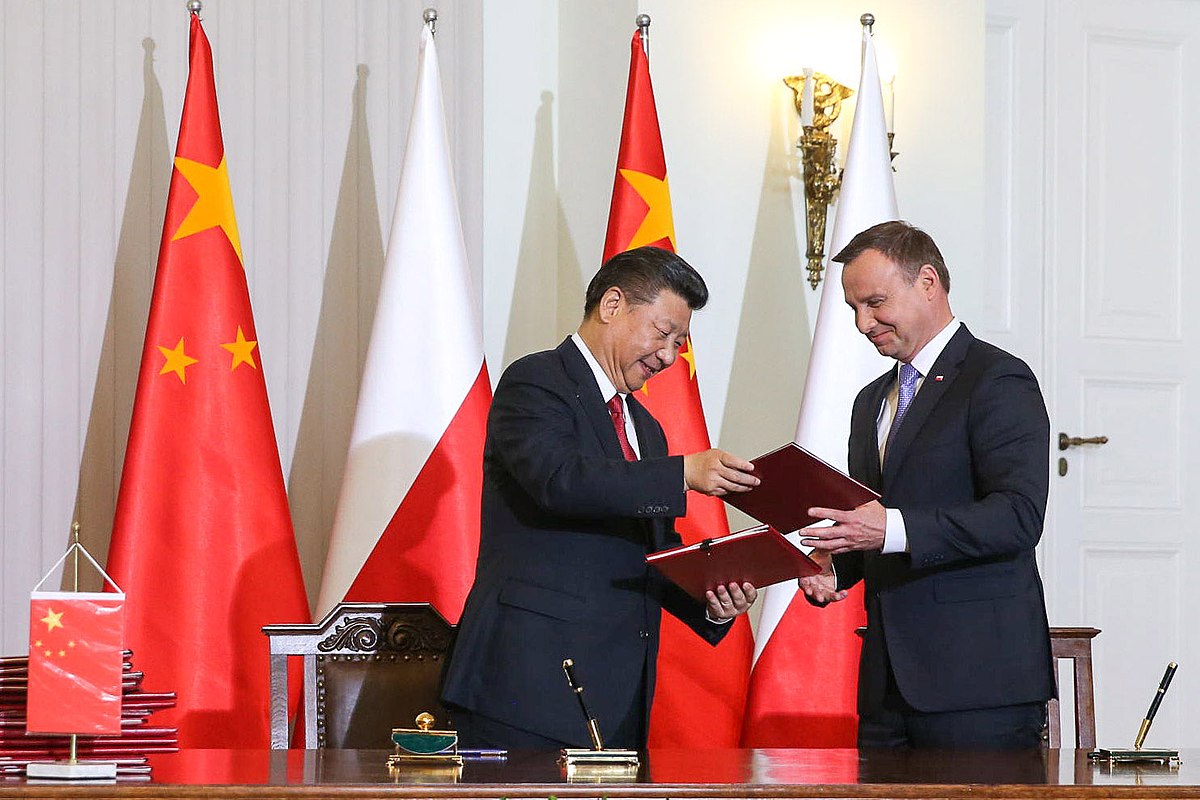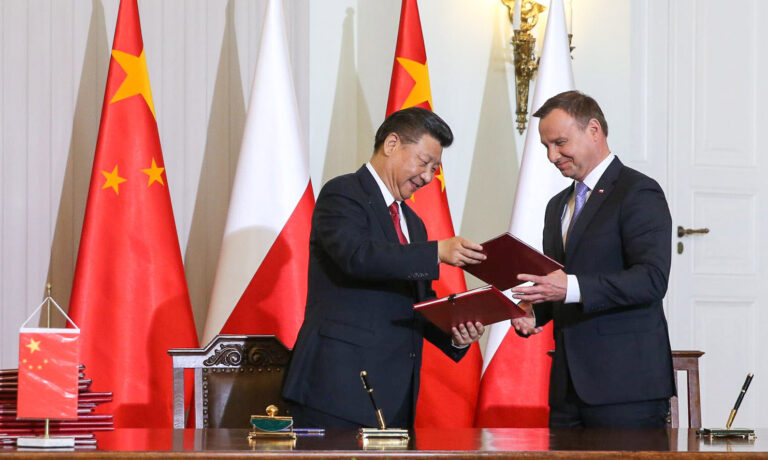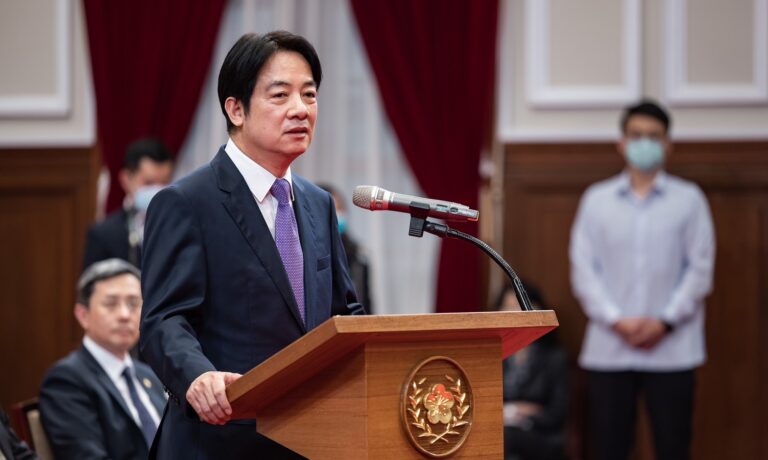
Beijing seems to have found an unlikely new friend in Europe as Poland pivots its foreign policy outlook.
While the relationship between the two nations underwent a rocky period of mutual distrust, Warsaw now appears to be betting on Beijing. However, rather than rediscovering the lost enthusiasm for relationship with China, Polish diplomacy maneuvers are aiming at targets far from Beijing.
Instead, Warsaw’s rapprochement with Beijing seems to be more of a tactical move to attract Washington and Berlin’s attention, rather than a strategic policy reorientation towards China.
Sino-Polish Relations in Flux
The first half of 2021 witnessed a series of high-level meetings and events suggesting that Poland was eager to reinvigorate its relations with China. Given Warsaw’s previously skeptical tone towards Beijing and the infamous arrest of an alleged Chinese spy in early 2019, the recent rapprochement has raised a few eyebrows, to say the least.
In late January, the Polish Foreign Minister Zbigniew Rau had a phone conversation with his Chinese counterpart Wang Yi to discuss closer bilateral and multilateral cooperation. In early February, Polish President Andrzej Duda joined the latest virtual 17+1 summit, despite this year’s historically low representation of other heads of state at the event.
In March, Duda also had a telephone conversation with Xi Jinping, during which the two leaders discussed purchasing Chinese COVID-19 vaccines by Poland. In April, China’s top political advisor Wang Yang held talks with Tomasz Grodzki, the speaker of Polish Senate. Finally, in late May, Rau visited China, where he held bilateral discussions with Wang Yi and expressed his support for the controversial Comprehensive Agreement on Investment (CAI) between China and the EU. According to Chinese state-affiliated tabloid Global Times, the Polish Foreign Minister reportedly said that the deal “is the best option that is beneficial for both sides, thus the two should strive to properly handle differences”.
Yet, less than half a year before Rau’s visit to China, representatives of the Polish MFA were among the most vocal opponents of the manner in which CAI negotiations were concluded.
In December 2020, when the EU and China reached an agreement in principle on investment, Warsaw regarded the process as too hasty and not based on a democratic consensus between all EU member states regarding their strategy towards China. In Rau’s words, by speeding up the already prolonged negotiations, “the European Commission and the German presidency brought upon Europe long-term problems organized in an extralegal format all for some quick media fireworks”.
Shortly afterwards, the Polish MFA also expressed its full support for the EU High Representative’s declaration on the deterioration of the human rights situation in Hong Kong, demanding Beijing to “respect the basic freedoms in Hong Kong and enable the opposition to function“.
In early 2021, these words seem to have been a continuation of Warsaw’s growing skepticism towards Beijing. A more cautious sentiment manifested itself as early as 2017, when Polish decision makers began to realize that closer political ties with China did not translate into many tangible, positive outcomes that had been previously anticipated.
Moreover, because of Warsaw’s close ties with Washington, Poland’s sole security guarantor in the region, Donald Trump’s containment policy also affected the country’s strategic considerations. This was partially reflected in the arrest of a Polish ex-security officer and a Chinese Huawei employee in Warsaw under spying allegations, followed by a still ongoing debate on banning Huawei from building Poland’s 5G networks.
Last but not least, the onset of the COVID-19 pandemic and problems surrounding China’s ‘mask diplomacy’ also contributed to the growing levels of distrust towards Beijing among the broader public. Indeed, many were led to believe that Poland found it increasingly difficult to engage with China. However, despite all these developments, Warsaw’s sudden change of heart about China emerged to overtake the suspected skepticism.
Sources of Warsaw’s Distrust
“No important event concerning Central and Eastern Europe can take place without the presence of Poland.”
So commented President Duda in the context of his attendance at the latest 17+1 summit. His words can serve as an indication of the attitude that has recently led Poland to reshuffle its diplomacy.
As the geopolitical landscape of the EU-US and Poland-US ties began to change significantly in the advent of the Biden administration, Warsaw found it relatively difficult to navigate this new environment. Under Donald Trump, Polish-American relations remained unprecedently positive, especially in comparison with the tense ties with many other European capitals felt during Trump’s time in office.
The Republican president’s administration emphasized certain ideological synergies with Poland’s ruling Law and Justice party, which made cooperation easier. Moreover, the Trump Administration’s approach towards issues of strategic importance to Poland, such as blocking the construction of Nord Stream 2, was clearly aligned with Warsaw.
However, Joe Biden’s first 100 days in office made it clear that Washington was placing its focus firmly on improving relations with its strongest European partners in political and economic terms, namely Germany and France, leaving Warsaw and other countries further East behind.
In May, following US-German confidential talks, the US Secretary of State Antony Blinken announced that Washington would waive sanctions on the consortium building the Russian Nord Stream 2 gas pipeline. For Poland, the move was regarded as greatly undermining NATO eastern flank’s security. Poland’s Foreign Minister declared in an interview that he had learned about it from the media as “our American allies did not find time to consult with the region most exposed to the consequences of that decision”.
Lastly, the Biden-Putin summit in Geneva left Poland with even more sense of dissatisfaction, since Franco-German support for re-engaging with Russia seemingly resulted only in diplomatic gains for Moscow while exposing the deep-seated divisions within the EU.
Polishing China’s Image
The sudden turn in tact by Warsaw has not been taken for granted by Beijing. To the contrary, it has been skillfully exploited as China seeks to stem the damage from the disintegration of the 17+1 format and blackening of its image across the region.
When Lithuania officially announced it would limit its participation in the initiative and yet more members expressed dissatisfaction with the platform, China doubled down on its diplomatic efforts to create an impression that cooperation with the region is still thriving. Poland, the region’s largest representative by both population and land area, seems to have been chosen as a fitting target for these PR efforts.
Throughout this image-repair effort, Sino-Polish rapprochement has been lauded by Chinese media, with the Global Times highlighting its “positive synergies” in spite of recent tensions between the EU and China. Beijing’s representatives have also tried multiple times to draw parallels between China’s new Five-Year Plan and Poland’s post-pandemic recovery program, also known as the Polish Order.
In a manner typical for Chinese media, Rau’s statements were framed to fit the official rhetoric of the Chinese Communist Party (CCP), with laudatory remarks about the Chinese leadership’s excellence in “applying the unique wisdom accumulated over thousands of years to address the challenges facing modern society.” Most recently, similar remarks were promoted for domestic audiences on the occasion of the CCP’s centenary. During a celebratory seminar organized by the Embassy of China in Warsaw, public figures ranging from politicians to journalists have allegedly praised China’s “great economic miracle” and its “miraculous speed of anti-pandemic efforts”.
Although it remains unclear whether Warsaw’s new-found interest in strengthening cooperation with Beijing will last, it seems clear that Poland and China’s motivations behind it are divergent. For the former, it seems to be a move motivated by a growing feeling of disappointment and distrust towards its Western partners. For the latter, it appears to be only one element of a broader strategy to rebalance the increasingly uneasy relationship with the European countries.
Whether these two impulses can produce any tangible outcomes in terms of US concessions or greater EU attention to Poland remains to be seen. However, these tangible results will be the key for Warsaw as it weighs its willingness to divert from its newfound openness toward Beijing.
Written by
Alicja Bachulska
a_bachulskaDr. Alicja Bachulska is a Research Fellow at CHOICE and Policy Fellow at the European Council on Foreign Relations where she focuses on Chinese foreign policy and China-EU relations.


